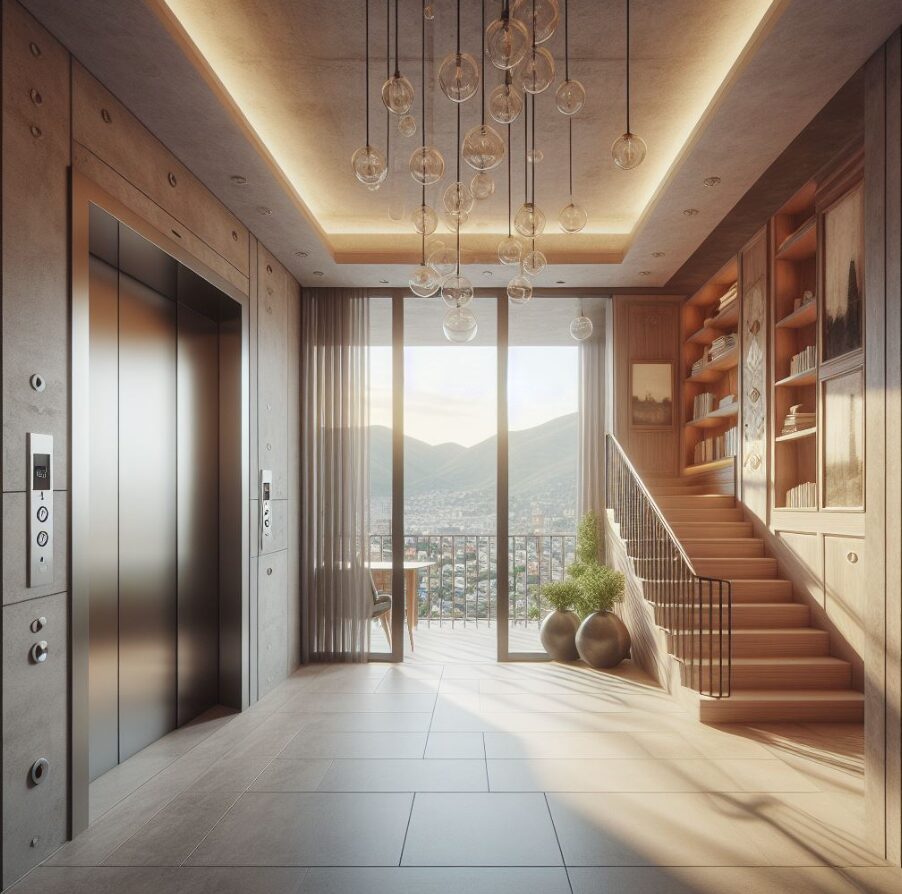Before installing a private residential elevator in your home, it’s essential to weigh the pros and cons of this luxury and convenience.
To help you decide if this would benefit you, keep reading as we examine the pros and cons of installing a home elevator.
Pros
Convenience and Accessibility
Residential elevators offer accessibility and convenience for all household members. It’s also a game-changer for persons with limited mobility or seniors.
A home elevator offers a convenient solution for moving people and objects between floors, avoiding the potential hazards and strain of stairs.
An elevator can be a significant quality-of-life improvement for homeowners.
Increased Property Value
Having a residential elevator can be a significant advantage as it can increase the value of your property. It can also make your home stand out from other properties in the market.
For homebuyers, the presence of an elevator can be a highly desirable feature, particularly for those seeking accessibility or planning for their future needs.
A home elevator can be a significant draw for aging homeowners or those with mobility issues, enabling them to remain in their residences comfortably as their needs change.
Adding an elevator to your home can increase resale value by appealing to a broader range of buyers.
In fact, according to data provided by the National Association of Realtors (NAR), properties with elevators generally sell for a higher price per square foot than similar homes without elevators.
Bottom line, this investment in accessibility and convenience can pay off when selling your home.
Some key statistics about elevators in residential homes:
- ⬥Increased Value: Studies suggest homes with elevators can sell for 10% to 25% more per square foot
- ⬥Location Matters: Elevators might be more valuable in areas with retirees or those seeking accessibility features
- ⬥Size Matters: In smaller homes, the elevator’s space usage might outweigh the value increase
- ⬥Condition is Key: A well-maintained, modern elevator adds more value than an old one
Cons
Cost
Home elevators can be convenient, but they come with downsides. The installation cost can be significant, ranging from tens to hundreds of thousands of dollars.
Additionally, ongoing maintenance and repair costs must be considered, making it a long-term financial burden for homeowners.
Space Requirements
Installing a home elevator may require a dedicated shaft or enclosure, taking up valuable square footage.
Integrating an elevator seamlessly into a home’s existing architecture and flow can also be a challenge.
You must carefully evaluate how an elevator would fit into your floor plan without compromising the functionality or aesthetics of your living space.
Also, it’s important to consider the elevator’s design and appearance to ensure it complements the home’s overall aesthetic.
Energy Consumption
When considering a home elevator, it’s important to consider the impact on your energy consumption and environmental footprint.
Elevators require electricity to operate, which can raise monthly bills and have a more significant environmental impact.
Evaluating the elevator’s energy efficiency and the overall energy profile of the home can help determine if the convenience outweighs the potential costs.
Safety Considerations
When considering a residential elevator, addressing potential safety and security concerns is important.
Mechanical failure or power outages pose user risks, and access control measures must be implemented to prevent unauthorized use.
Thorough evaluation and ongoing maintenance can help you determine whether the benefits of a residential elevator outweigh the risks.
In conclusion, the decision to install a home elevator should be based on careful consideration of its advantages and disadvantages.
Although it offers accessibility and convenience, especially for people with mobility issues, it also has drawbacks, such as high installation costs and maintenance requirements.
However, suppose you do decide to install a home elevator. In that case, it can improve your quality of life and increase your property’s value.
Ultimately, the decision rests with you and what you feel is best for your home and lifestyle.
Outdoor Fireplaces vs. Fire Pits: Which One is Right for Your Home?


